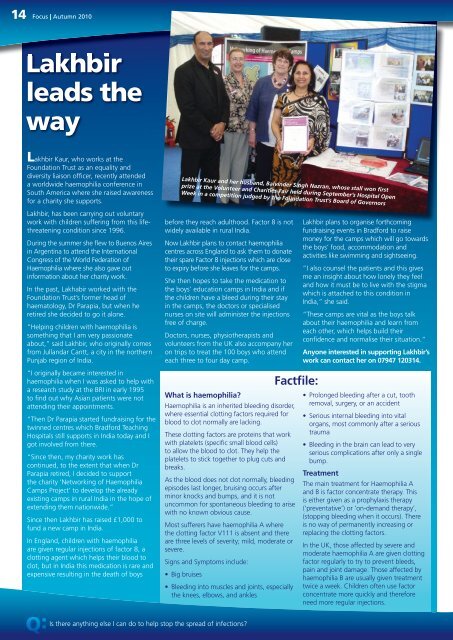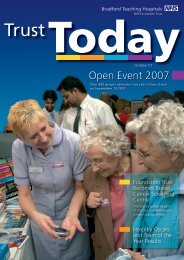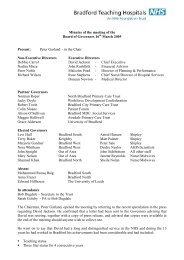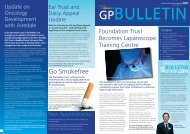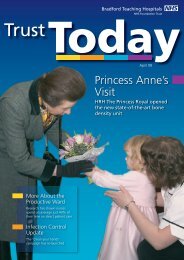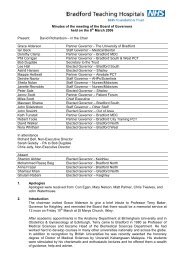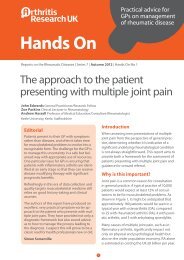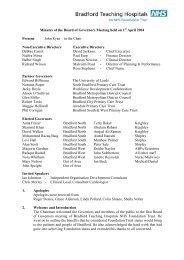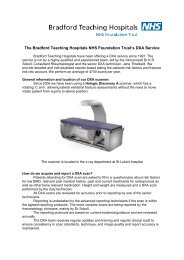Download this publication as PDF - Bradford Teaching Hospitals ...
Download this publication as PDF - Bradford Teaching Hospitals ...
Download this publication as PDF - Bradford Teaching Hospitals ...
You also want an ePaper? Increase the reach of your titles
YUMPU automatically turns print PDFs into web optimized ePapers that Google loves.
14<br />
Focus | Autumn 2010<br />
Lakhbir<br />
leads the<br />
way<br />
Lakhbir Kaur, who works at the<br />
Foundation Trust <strong>as</strong> an equality and<br />
diversity liaison officer, recently attended<br />
a worldwide haemophilia conference in<br />
South America where she raised awareness<br />
for a charity she supports.<br />
Lakhbir Kaur and her husband, Balvinder Singh Nazran, whose stall won first<br />
prize at the Volunteer and Charities Fair held during September’s Hospital Open<br />
Week in a competition judged by the Foundation Trust’s Board of Governors<br />
Lakhbir, h<strong>as</strong> been carrying out voluntary<br />
work with children suffering from <strong>this</strong> lifethreatening<br />
condition since 1996.<br />
During the summer she flew to Buenos Aires<br />
in Argentina to attend the International<br />
Congress of the World Federation of<br />
Haemophilia where she also gave out<br />
information about her charity work.<br />
In the p<strong>as</strong>t, Lakhabir worked with the<br />
Foundation Trust’s former head of<br />
haematology, Dr Parapia, but when he<br />
retired she decided to go it alone.<br />
“Helping children with haemophilia is<br />
something that I am very p<strong>as</strong>sionate<br />
about,” said Lakhbir, who originally comes<br />
from Jullandar Cantt, a city in the northern<br />
Punjab region of India.<br />
“I originally became interested in<br />
haemophilia when I w<strong>as</strong> <strong>as</strong>ked to help with<br />
a research study at the BRI in early 1995<br />
to find out why Asian patients were not<br />
attending their appointments.<br />
“Then Dr Parapia started fundraising for the<br />
twinned centres which <strong>Bradford</strong> <strong>Teaching</strong><br />
<strong>Hospitals</strong> still supports in India today and I<br />
got involved from there.<br />
“Since then, my charity work h<strong>as</strong><br />
continued, to the extent that when Dr<br />
Parapia retired, I decided to support<br />
the charity ‘Networking of Haemophilia<br />
Camps Project’ to develop the already<br />
existing camps in rural India in the hope of<br />
extending them nationwide.”<br />
Since then Lakhbir h<strong>as</strong> raised £1,000 to<br />
fund a new camp in India.<br />
In England, children with haemophilia<br />
are given regular injections of factor 8, a<br />
clotting agent which helps their blood to<br />
clot, but in India <strong>this</strong> medication is rare and<br />
expensive resulting in the death of boys<br />
Q:<br />
before they reach adulthood. Factor 8 is not<br />
widely available in rural India.<br />
Now Lakhbir plans to contact haemophilia<br />
centres across England to <strong>as</strong>k them to donate<br />
their spare Factor 8 injections which are close<br />
to expiry before she leaves for the camps.<br />
She then hopes to take the medication to<br />
the boys’ education camps in India and if<br />
the children have a bleed during their stay<br />
in the camps, the doctors or specialised<br />
nurses on site will administer the injections<br />
free of charge.<br />
Doctors, nurses, physiotherapists and<br />
volunteers from the UK also accompany her<br />
on trips to treat the 100 boys who attend<br />
each three to four day camp.<br />
What is haemophilia<br />
Haemophilia is an inherited bleeding disorder,<br />
where essential clotting factors required for<br />
blood to clot normally are lacking.<br />
These clotting factors are proteins that work<br />
with platelets (specific small blood cells)<br />
to allow the blood to clot. They help the<br />
platelets to stick together to plug cuts and<br />
breaks.<br />
As the blood does not clot normally, bleeding<br />
episodes l<strong>as</strong>t longer, bruising occurs after<br />
minor knocks and bumps, and it is not<br />
uncommon for spontaneous bleeding to arise<br />
with no known obvious cause.<br />
Most sufferers have haemophilia A where<br />
the clotting factor V111 is absent and there<br />
are three levels of severity; mild, moderate or<br />
severe.<br />
Signs and Symptoms include:<br />
• Big bruises<br />
• Bleeding into muscles and joints, especially<br />
the knees, elbows, and ankles<br />
Is there anything else I can do to help stop the spread of infections<br />
Factfile:<br />
Lakhbir plans to organise forthcoming<br />
fundraising events in <strong>Bradford</strong> to raise<br />
money for the camps which will go towards<br />
the boys’ food, accommodation and<br />
activities like swimming and sightseeing.<br />
”I also counsel the patients and <strong>this</strong> gives<br />
me an insight about how lonely they feel<br />
and how it must be to live with the stigma<br />
which is attached to <strong>this</strong> condition in<br />
India,” she said.<br />
“These camps are vital <strong>as</strong> the boys talk<br />
about their haemophilia and learn from<br />
each other, which helps build their<br />
confidence and normalise their situation.”<br />
Anyone interested in supporting Lakhbir’s<br />
work can contact her on 07947 120314.<br />
• Prolonged bleeding after a cut, tooth<br />
removal, surgery, or an accident<br />
• Serious internal bleeding into vital<br />
organs, most commonly after a serious<br />
trauma<br />
• Bleeding in the brain can lead to very<br />
serious complications after only a single<br />
bump.<br />
Treatment<br />
The main treatment for Haemophilia A<br />
and B is factor concentrate therapy. This<br />
is either given <strong>as</strong> a prophylaxis therapy<br />
(‘preventative’) or ‘on-demand therapy’,<br />
(stopping bleeding when it occurs). There<br />
is no way of permanently incre<strong>as</strong>ing or<br />
replacing the clotting factors.<br />
In the UK, those affected by severe and<br />
moderate haemophilia A are given clotting<br />
factor regularly to try to prevent bleeds,<br />
pain and joint damage. Those affected by<br />
haemophilia B are usually given treatment<br />
twice a week. Children often use factor<br />
concentrate more quickly and therefore<br />
need more regular injections.


